The author, maxfiner, graduated from Xi'an University of Electronic Science and Technology with a master's degree in signal and information processing. Maxfiner has worked in the wireless communication department of Huawei Communication Technology Co., Ltd., and has many years of experience in engineering project development. It also has algorithm theory research, simulation verification, and corresponding hardware design implementation capabilities. It has practical experience in all aspects of communication physical layer development and design. .
Engaged in signal processing related work, inevitably use some mathematical knowledge. Usually, when you use it, you go back and look at it, or say, you can't make up for it. There is some mathematical knowledge that is used frequently and repeatedly, so it is necessary to summarize them. Mathematical things, only reading mathematics books, are generally quite boring and boring, but when combined with practical applications, they find that the charm, power and power of mathematics are still very strong. Combined with practical problems, mathematics becomes interesting. Here, three cases are given for the time being, and the follow-up continues to be enriched and improved.
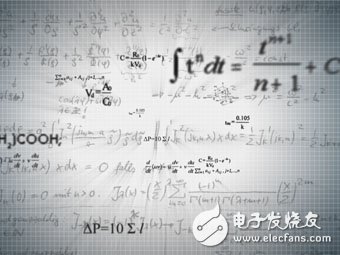
a plural concept
The plural can be said to be the number we have learned from small to big, and finally learned. From a historical point of view, it is also one of the last few introduced, and it has only been introduced and promoted in the last few hundred years. It was introduced to understand the convenience of the equation, and it has not been accepted at the beginning. These people include many great mathematicians. It can be seen that a new thing, a new concept, a new idea, it is very difficult and very long to be accepted. However, with the development of time, due to its unique value, it is finally accepted and widely used. In addition to understanding equations, in the field of engineering, the most useful value of complex applications is two directions, one is quantum mechanics and the other is electromagnetics.
The concept of complex numbers is widely used in the fields of electronic engineering, electromagnetic fields and electromagnetic waves, especially in the direction of signal processing. Whether it is the basic theory of signal processing - Fourier transform, or the baseband representation and band-pass representation of the signal, analytical representation, whether it is the analysis of the spectrum, or the time-shift and phase of the signal, are inseparable from the powerful The support of the tool.
Related concepts:
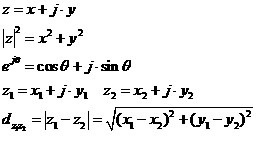
The application examples are briefly described below and will be described in more detail in the relevant sections.
BPSK, QPSK, 16QAM and other modulation methods, the signal constellation can be regarded as the representation of the complex domain of the signal quadrature component and the in-phase component.
The EVM test of the transmitter is calculated according to the position of the constellation point on the complex plane. The calculated target is the distance between the actually measured constellation point and the reference constellation point, or the distance between two points on the complex plane.
When there is a certain frequency offset in the receiver, the constellation points on the constellation will rotate at a constant rate, and the uniform circular motion will be made around the origin. The angular velocity of the motion is proportional to the magnitude of the frequency offset.
The impedance analysis and resonance analysis of the circuit are based on complex operations.
The spectrum of the real signal is conjugate symmetric. The mirror image of the spectrum can be represented by a conjugate component.
Both Agilent and Rohde Schwarz have vector signal generators, vector signal analyzers, which are all complex signals.
The channel estimation algorithm can be regarded as a complex division operation in essence.
The orthogonal up-conversion of the transmitter and the quadrature down-conversion of the receiver can be seen as a complex multiplication operation in nature.
The compensation of the receiver frequency offset can be regarded as a complex multiplication operation in essence.
The calculation of the power of each node on the transmitter link and receiver link is a complex modular squared calculation. It is widely used in signal power monitoring, analog automatic gain control (AAGC), digital automatic gain control (DAGC), etc. application.
Telescopic and translation of two signals
Signal stretching and translation, especially translation, has a wide range of applications in the theory and practice of signal processing. The relationship between the translation of the signal time domain and the phase shift of the frequency domain is a very wonderful and widely used pair relationship. The scaling and translation of the signal is mathematically the application of the function's expansion and translation. This is the category of high school elementary mathematics. It should be a very general concept and method that will not be forgotten even if it is not used for a long time. But because it is so important, it is necessary to take it out for a small summary to better use this effective tool to solve various signal processing related problems. This section is devoted to discussing and summarizing translation. The discussion of scaling will wait until the actual use of it (such as signal interpolation and extraction) is described accordingly.
The translation of the signal, the simplest is to remember four words - "plus left minus right." That is, if the amount of movement is a positive value, the entire signal waveform moves to the left, that is, to the negative axis direction of the x coordinate axis. When the amount of movement is a negative value, the entire signal waveform moves to the right, that is, to the positive axis direction of the x coordinate axis. Although Imagine that the psychological reaction time is slower than the imagination, but a lot of experience will be memorized.
For example, the unit sampling signal is  Think about it, what is the difference between a unit impact signal? ),As shown below:
Think about it, what is the difference between a unit impact signal? ),As shown below:
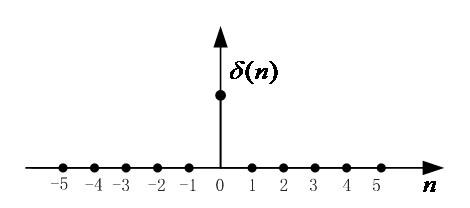
If the signal form is  Then the entire waveform is moved to the left by 5 sample points, as shown in the following figure:
Then the entire waveform is moved to the left by 5 sample points, as shown in the following figure:
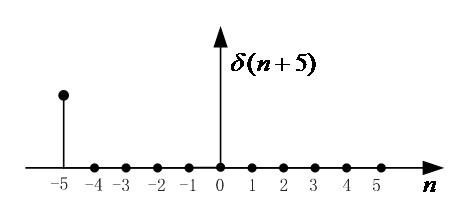
For a general signal  It can be expressed as follows according to the translational properties of the unit sampled signal:
It can be expressed as follows according to the translational properties of the unit sampled signal:

That is to say, any discrete signal can be expressed as a linear superposition of the unit sampled signal. From a signal and system perspective, this is a manifestation of a systematic linear overlay. The system here, of course, is a linear time-invariant system that satisfies homogeneity, superposition and time invariance, which is a prerequisite for all our analysis of signals and systems.
Three-sum difference product formula
The most common and frequent application of the accumulation and difference formula is the up-and-down conversion of the signal. Subsequent we will combine the baseband representation of the signal with the bandpass representation for a more detailed description.
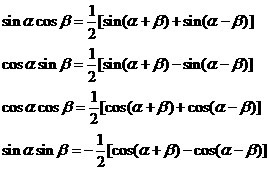
If you can't remember these four formulas at once, you can understand the third one first, and then analogy. Although mathematics needs to be understood, it has been proven that some of the most commonly used concepts and formulas are well remembered for better and more efficient applications.
For example, triangulation formulas such as integration and difference, such as Shannon formula, such as the Nth power of 2 (2
The next issue is to talk about the proficient signal processing design of small TIps (6): how is the convolution obtained? stay tuned!
Disclaimer: Electronic enthusiast network copyright, declined to reprint!
Proficient in Signal Processing Design Small TIps(1): Signals and Information
Proficient in signal processing design, small TIps (2): the role of mathematics
Proficient in signal processing design, small TIps (3): the three cornerstones that must be mastered
Proficient in signal processing design Small Tips(4): Several signals that are most frequently used
Product application:
â– Products for commercial,household,lighting
Product features:
â– Good heat dissipation
--Blade design of copper alloy contacts,good conductivity
â– Super high impact resistance and thermal stability
--Cover pans are made of high quality polycarbonate
â– Chemical corrosion resistance
-- Corrosion resistant galvanized mounting bracket
â– Grounding.Connection mode
--One-piece grounding design
---Clip in type wiring,spring sheet lock,suitable for #14AWG
hard copper wire
Duplex Receptacle TR UL,White Duplex Receptacle TR UL,Electrical Duplex Receptacle TR UL,Wall Duplex Receptacle TR UL
Hoojet Electric Appliance Co.,Ltd , https://www.hoojetgfci.com